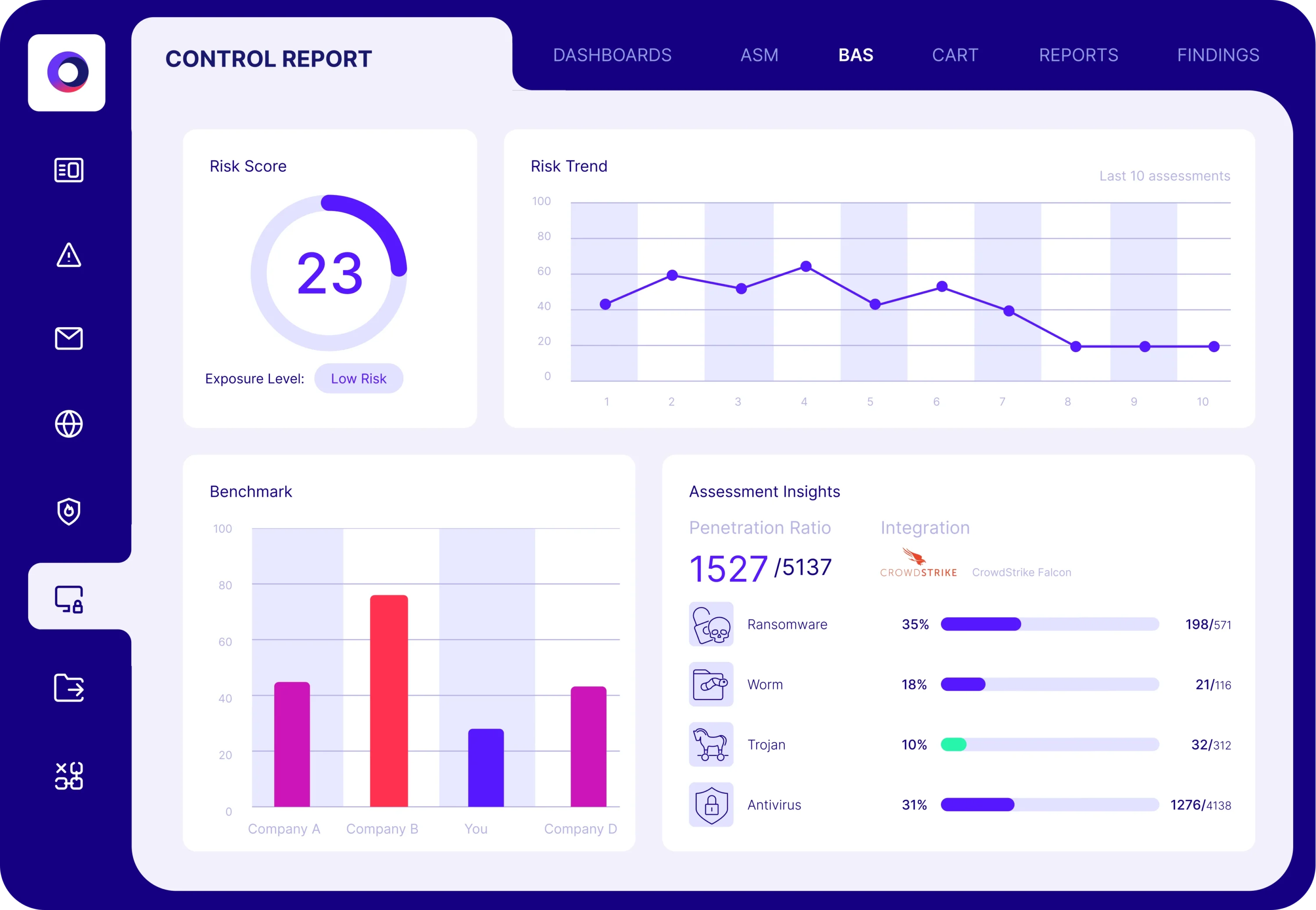SOC Automation: Optimize Your SOC Workflow

SOC Automation: Optimize Your SOC Workflow
Security operations centers (SOCs) are the nerve centers of modern cybersecurity, where threats are identified, assessed, and neutralized around the clock. But as threat volumes surge and attack sophistication grows, many SOCs find themselves stuck in a reactive loop — overwhelmed by alert fatigue, resource bottlenecks and inconsistent response efforts.
Automation offers a way out, not by replacing human analysts, but by augmenting their capabilities, accelerating detection and response and ensuring that actions are rooted in validated security outcomes.
Cymulate empowers this smarter approach to SOC automation by continuously testing and optimizing workflows, ensuring every automated decision contributes to real risk reduction. We’ll get to how Cymulate helps later, but for now let’s explore the ins and outs of SOC automation and why it could be relevant to your organization.
What Is SOC Automation (and What It’s Not)
SOC automation refers to the use of tools and workflows to automate repetitive, time-consuming tasks within the SOC, such as alert triage, data enrichment, threat intelligence ingestion and initial response actions.
This doesn’t mean handing over the SOC to machines. It means enhancing analysts’ ability to focus on high-value activities while reducing cognitive overload and burnout.
Contrary to what you might think, SOC automation does not eliminate jobs. There remains a critical need for human management and intervention when it comes to operating the SOC.
Instead, SOC automation empowers human analysts by taking over routine functions and enabling a faster, more consistent response. From auto-triaging a flood of low-level alerts to launching playbooks for common threats, automation helps streamline and scale SOC operations without compromising security rigor.
Key Benefits of SOC Automation
Implementing a strategy around SOC automation can create tangible, lasting benefits for both your security environment and the people responsible for managing it.

Faster Mean Time to Respond (MTTR)
SOC automation enables near-instant triage and response, allowing teams to drastically reduce MTTR and contain threats before they escalate. Automated workflows correlate alerts, prioritize severity and trigger predefined actions, shaving hours or even days off traditional manual efforts.
Reduced Analyst Fatigue
With thousands of alerts per day, even the most experienced analysts face cognitive overload. Automating repetitive triage tasks and false-positive filtering significantly reduces alert fatigue and lowers the risk of burnout. This potentially translates to better morale, retention and performance across the SOC at a time when turnover and business continuity can often be issues.
Improved Accuracy and Consistency
Manual processes introduce variability and human error. Automation enforces standardized processes, ensuring responses are consistent, compliant and based on predefined logic.
Scalable to Hybrid and Cloud Environments
Modern SOC managers must monitor complex hybrid infrastructures. Automation provides the scalability and agility needed to keep up, enabling security teams to manage larger environments without linearly increasing headcount.
The Role of AI for the SOC
With discussion of automation in tech, the conversation will generally turn to AI. As such, AI has taken a major role in SOC operations and can help your organization meet its automation goals. As of right now, AI in SOC operations is trending toward:
- Generative AI for Alert Summarization: Providing high-level context, summaries, and recommendations in human-readable form.
- Predictive Threat Modeling: Using historical and environmental data to predict where attacks are likely to occur.
- Decision Support Systems: Recommending the most effective containment or mitigation steps based on real-time threat intelligence.
As generative AI models improve, they will support SOC analysts not just in detection but in communicating risk to stakeholders and automating decision-making at scale.
AI and ML are no longer experimental technologies in cybersecurity—they’re foundational to modern SIEM architectures. AI SIEM solutions deliver scalable, intelligent threat detection, enabling SOCs to operate efficiently in high-volume, high-stakes environments.
The Cymulate Advantage for SOC Automation
Cymulate complements SOC automation efforts by validating whether detection and response mechanisms work as intended. The platform provides a continuous threat exposure management (CTEM) offering that puts proven threat validation at the forefront of your efforts.
Through continuous threat validation, Cymulate ensures that automation doesn’t just happen — it works. SOC teams can simulate attacks, test playbooks and validate whether responses mitigate real-world threats. They can then prioritize what exposures are most critical to address and determine what steps need to be taken for remediation.

Use Cases: Where Automation Adds the Most Value
Detection
Automate correlation of telemetry data across SIEMs, EDRs and network sensors to identify early-stage threats faster.
Cymulate Advantage: By continuously validating detection logic, Cymulate ensures telemetry signals align with the most current threat behaviors so automation doesn’t miss evolving attack patterns.
Triage
Classify, enrich, and prioritize alerts automatically to surface what truly matters. Integrate threat intelligence sources to contextualize alerts in real time.
Cymulate Advantage: Test your triage workflows with Cymulate Breach and Attack Simulation (BAS) capabilities. Inject simulated threats and confirm your system triages and classifies them correctly.
Response
Trigger predefined actions, such as isolating endpoints, revoking credentials or blocking IPs, with minimal analyst intervention.
Cymulate Advantage: Cymulate validates whether automated responses are effective, not just triggered. This feedback loop ensures SOAR and SIEM playbooks result in actual threat mitigation, not just procedural execution.
Compliance
While compliance isn’t the primary goal of SOC automation, it benefits greatly from automated consistency and validation. For frameworks like SOC 2, automation helps:
- Generate consistent evidence of security operations
- Enforce policy controls and documentation standards
- Streamline audits by validating control effectiveness with real data
Cymulate Advantage: The Cymulate continuous validation engine supports these efforts by providing auditors with concrete proof that detection and response workflows operate as designed.
Cymulate Assists in Automating (and Optimizing) the SOC
SOC automation without validation is risky. Misconfigured rules, untested playbooks, or blind reliance on machine-triggered actions can introduce new vulnerabilities or fail to stop real threats.
Cymulate bridges this gap by ensuring that every automated workflow, rule and playbook is stress-tested against real-world scenarios using these tactics:
- Security Control Validation: Test if automated actions — like endpoint isolation or credential resets — actually reduce risk across your specific environment.
- SIEM/SOAR Optimization: Use Cymulate to simulate attacks and measure if your SIEM/SOAR platforms detect and respond effectively.
- Continuous Exposure Validation: Map automation coverage to your actual risk exposure. If automated playbooks don’t align with real threat vectors, Cymulate flags the gaps.

Cymulate turns SOC automation from a set-it-and-forget-it toolset into a living, validated system that adapts to emerging threats and shifting environments.
It’s Time to Automate Smarter
SOC automation is not about doing more — it’s about doing better. The most effective SOCs use automation not only to speed up response but to ensure every step in the process is validated, resilient and aligned with actual risk reduction.
Cymulate enables smarter automation through continuous security validation, SIEM/SOAR optimization and exposure management. Instead of blindly scaling automation, Cymulate helps SOCs optimize it, making sure your tools and playbooks deliver measurable outcomes.
Explore how Cymulate can elevate your SOC automation strategy by ensuring that every alert triage, response playbook and detection rule is battle-tested and outcome-driven.


